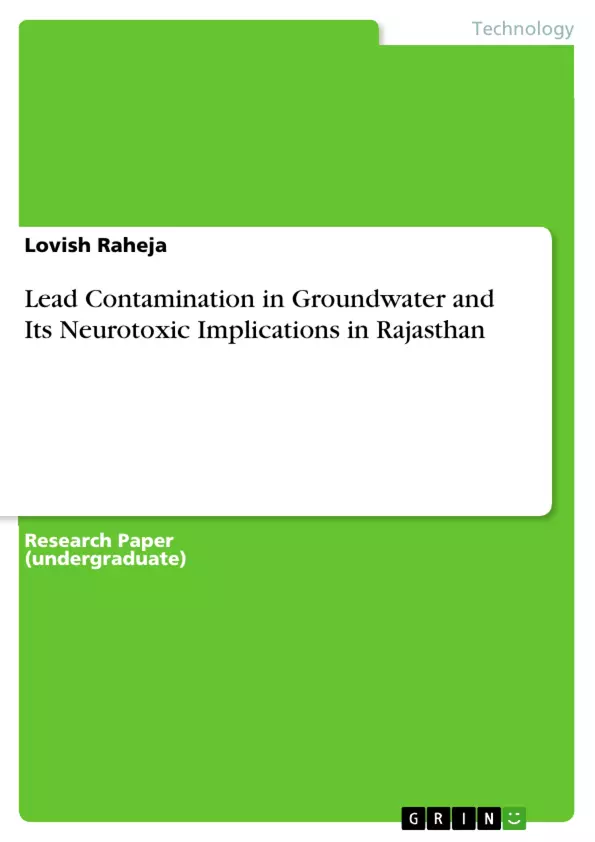Groundwater accounts for about 97% of the world's fresh water, serving as a crucial resource for various human activities such as urban water supply, agriculture, and industry. However, the growing demand for groundwater extraction, driven by advancements in technology and population growth, has led to increased stress on these resources. Consequently, this heightened exploitation raises the risk of groundwater contamination, particularly from toxic metals like lead (Pb).
Lead contamination in groundwater poses significant health risks, especially for vulnerable groups like children. Even at low concentrations, lead, commonly found in various industrial processes, can have severe adverse effects on human health. Children, in particular, are susceptible to lead's neurotoxic effects, which can lead to long-term cognitive impairments and developmental disorders.
Rajasthan heavily relies on groundwater for irrigation and drinking water needs, making it particularly susceptible to lead contamination. Despite numerous studies highlighting heavy metal contamination in Rajasthan's groundwater, a comprehensive overview specifically focusing on lead contamination and its neurotoxic effects is lacking. Therefore, this study aims to fill this gap by systematically examining the state of lead contamination in Rajasthan's groundwater and its implications for public health.
The objectives of this study are to identify the main sources of lead contamination in Rajasthan's environment, elucidate the mechanisms and pathways through which lead contaminates groundwater, assess the current status of lead contamination in groundwater, evaluate its potential exposure to the general population, and examine the neurotoxic implications of such exposure. Additionally, the study aims to provide recommendations for policymakers to mitigate population exposure and associated health risks.
By addressing these research questions, this study seeks to provide valuable insights into the extent of lead contamination in Rajasthan's groundwater and its broader public health implications. The findings and recommendations generated from this study have the potential to inform evidence-based policy interventions aimed at protecting public health and mitigating the adverse effects of lead contamination on vulnerable populations.
Inhaltsverzeichnis (Table of Contents)
- INTRODUCTION
- RESEARCH PROBLEM
- OBJECTIVE OF THE STUDY
- RESEARCH QUESTIONS
- RESEARCH METHODOLOGY
- Exposure Assessment to General Population
- Intake Dose
- Chronic Daily Intake
- Hazard Quotient (HQ)
- Cancer Risk
- SOURCES OF LEAD CONTAMINATION
- PATHWAY OF GROUNDWATER CONTAMINATION AND FURTHER EXPOSURE
- Groundwater Contamination Caused by Mining
- Groundwater Contamination Caused by Industrial Processes
- Groundwater Contamination through Open Disposal of Toxic Waste
- Exposure to Contaminated Groundwater
- PRESENT STATUS OF LEAD CONTAMINATION OF GROUNDWATER IN RAJASTHAN
- Exposure Assessment to the General Population
- Intake Dose
- Chronic Daily Intake
- Hazard Quotient
- Cancer Risk
- NEUROTOXIC IMPLICATIONS OF PRESENT STATUS OF LEAD CONTAMINATION IN RAJASTHAN
- RECOMMENDATIONS
- CONCLUSION
- Lead contamination in groundwater in Rajasthan
- Sources and pathways of lead contamination
- Neurotoxic implications of lead exposure
- Risk assessment of lead contamination
- Policy recommendations to mitigate lead contamination
- Introduction: This section provides a detailed overview of the global context of groundwater contamination, highlighting its significance as a major source of freshwater. It emphasizes the growing exploitation of groundwater resources and the associated risks of contamination, particularly by heavy metals such as lead. The introduction also outlines the specific focus of this study, namely, the assessment of lead contamination in groundwater in Rajasthan and its neurotoxic implications.
- Research Problem: The chapter examines existing research on heavy metal contamination in Rajasthan, revealing gaps in understanding the comprehensive picture of lead contamination and its neurotoxic effects. It highlights the urgent need for a focused study on lead contamination in the state and its potential impact on public health.
- Objective of the Study: This section clearly defines the main objective of the research, which is to conduct a comprehensive study of lead contamination in groundwater in Rajasthan and analyze its neurotoxic implications. It also sets the stage for addressing the identified research gaps and providing valuable insights into this pressing issue.
- Research Questions: This chapter outlines the specific research questions that guide the study, focusing on the identification of sources of lead contamination in the environment, particularly in Rajasthan, and their prevalence. It also explores the pathways of contamination and potential neurotoxic effects associated with lead exposure.
- Research Methodology: This chapter delves into the research methodology employed in the study, including the methods used for assessing the exposure to lead in the general population. This section outlines the specific approaches adopted to assess the intake dose, chronic daily intake, hazard quotient, and cancer risk associated with lead contamination. It also sheds light on the sources of lead contamination and the pathways through which groundwater can become contaminated. The chapter provides a detailed explanation of the methodology used for studying the present status of lead contamination in groundwater in Rajasthan and the techniques for assessing the neurotoxic implications of the contamination.
Zielsetzung und Themenschwerpunkte (Objectives and Key Themes)
This study aims to thoroughly analyze lead contamination in groundwater in Rajasthan and investigate its neurotoxic implications. This research aims to inform and guide policy decisions towards a sustainable and healthy future for the region.
Zusammenfassung der Kapitel (Chapter Summaries)
Schlüsselwörter (Keywords)
This study focuses on the key themes of groundwater contamination, lead exposure, neurotoxicity, and public health risks. It investigates the impact of lead contamination on the health of the population of Rajasthan, particularly the neurotoxic effects of lead exposure through contaminated water sources. The research utilizes a combination of environmental monitoring, risk assessment techniques, and existing data analysis to provide a comprehensive understanding of the issue. The study also aims to identify and prioritize key policy recommendations for mitigating lead contamination in groundwater.
- Quote paper
- Lovish Raheja (Author), 2022, Lead Contamination in Groundwater and Its Neurotoxic Implications in Rajasthan, Munich, GRIN Verlag, https://www.hausarbeiten.de/document/1453290


